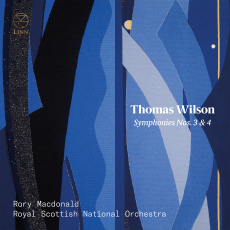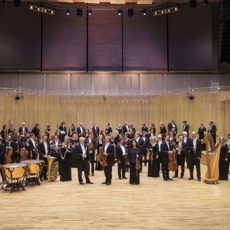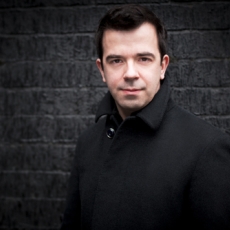Rory Macdonald & RSNO - Thomas Wilson: Symphonies Nos. 3 & 4 - Planet Hugill
Reassessing the symphonies of one of the major figures in post-War Scottish music.
My first encounter with Thomas Wilson's music was his opera Confessions of a Justified Sinner which I saw at Scottish Opera in the 1970s and which made a very strong impression on me. I have always been slightly puzzled as to why it has not been revived.
This disc from Linn Records features three of Wilson's symphonic works, Symphony No. 3, Symphony No. 4 'Passeleth Tapestry' and Carillon performed by the Royal Scottish National Orchestraconducted by Rory Macdonald.
Born in the USA to Scottish parents, Thomas Wilson returned to the UK when very young and lived and worked in Scotland for most of his life, reading music at the University of Glasgow under Ernest Bullock and Frederick Rimmer. He would eventually become professor at the University. Wilson established himself as a strong and important part of contemporary Scottish musical life with his work being championed by conductors such as Alexander Gibson, James Loughran and Bryden Thomson. Since his death in 2001 his music has languished somewhat, and the fact that his style generally eschewed elements of modernism has perhaps something to do with this. But this disc reveals a distinctive talent with some powerfully well-made music which fits easily into the stylistic diversity of our modern musical world.
Wilson's Third Symphony was written in 1979. It is in five sections, playing without a break, in which fast and slow tempi alternate and the intention is to create the sense of a life-journey from birth, through upheaval to quietude and then possibly re-birth. The work was commissioned by the then Scottish National Orchestra which premiered it under Sir Alexander Gibson in 1979. We start from almost nothing, with music full of quiet gestures rather than themes, as pitch, harmony and rhythm gradually emerge. This is the edgiest of the three works on the disc, the one notable more for its densely wrought argument than for the colour of the orchestral writing. In this, Wilson comes closest to his modernist contemporaries.
The Fourth Symphony was commissioned to mark Paisley's 500th anniversary as a Burgh of Barony, which explains the work's subtitle as Passeleth is the 12th century form of the town's name! Again it is a single movement, multi-sectional work with each movement evoking a particular era. The work was premiered in 1988 at Paisley Abbey, performed by the Scottish National Orchestra conducted by Bryden Thompson.
The work opens with a carillon (A, E flat, E, B flat) derived in some way from the name Paisley, the Abbey and the Stewarts (the royal dynasty associated with the town), though the effect is in fact somewhat gamelan-like. The orchestral writing is full of colour, yet closely argued. Stylistically, the work remains somewhat out of time, with Wilson's writing harking back to earlier in the 20th century and there seemed to be influences of Stravinsky and RVW in the mix.Yet the piece deserves to be taken on its own terms, and is undoubtedly terrific. It is quite a long work (near 30 minutes), but Wilson ensures that the piece remains full of interest and engagement. and Rory Macdonald and the orchestra certainly hold our attention in what is a superb performance of quite a showpiece.
The final work on the disc Carillon was commissioned in 1990 for the Glasgow City of Culture celebrations when it was performed by the SNO and Bryden Thomson to inaugurate the city's new Royal Concert Hall. The work opens with a fanfare based on four notes taken from the word Glasgow (G, A, E flat (S)). And this bold opening gesture is the basis for the whole work, the music unfolds in an almost pictorial, rather filmic way and the sound-world is often akin to British music of the 1950s with its sense of well-made orchestration and rich colours in the orchestra. Wilson's handling of the multi-sectional structure hints at a wider narrative, and it rather comes over as the score for an unwritten film.
Performances from Rory Macdonald and the RSNO are excellent, bringing out both the colour and the argument of the music and holding us throughout all this fascinating music. This is a fine examination of the music of one of Scotland's major figures from the later 20th century. If Thomas Wilson's music does not quite fit into the modernist mould expected of a composer from this period, then we can now listen to it with a greater degree of perspective and enjoy the craftmanship, colour and imagination which characterise the pieces on this disc. There is not a significant amount of Wilson's music available on disc, and certainly this is the most significant release of his music for some years and we music hope that there is more to come.


